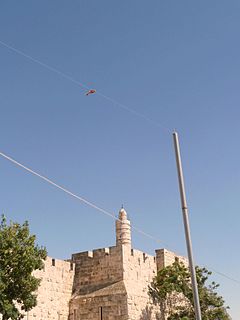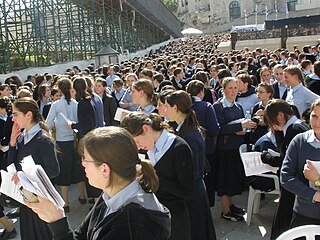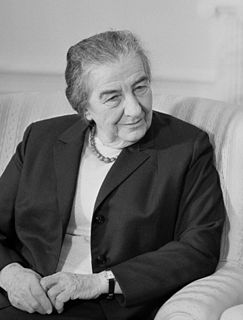A kolel or kollel is an institute for full-time, advanced study of the Talmud and rabbinic literature. Like a yeshiva, a kollel features shiurim (lectures) and learning sedarim (sessions); unlike a yeshiva, the student body of a kollel consists of married men for the most part. A kollel generally pays a regular monthly stipend to its members.

Hebron Yeshiva, also known as Yeshivas Hevron, or Knesses Yisroel, is a yeshiva devoted to high-level study of the Talmud. It originated in 1924 when the roshei yeshiva and 150 students of the Slabodka Yeshiva, known colloquially as the "mother of yeshivas", relocated to Hebron.

Yeshiva Rabbi Chaim Berlin or Yeshivas Rabbeinu Chaim Berlin, is an American Haredi Lithuanian-type boys' and men's yeshiva located in Brooklyn, New York. Established in 1904 as Yeshiva Tiferes Bachurim, it is the oldest yeshiva in Kings County. At the suggestion of Meir Berlin (Bar-Ilan), it was renamed for his brother, Chaim Berlin, the chief rabbi of Moscow who had moved to Jerusalem and was one of its leading rabbis at the time of his death.
Rosh yeshiva is the title given to the dean of a Talmudical academy (yeshiva). It is a compound word of the Hebrew words rosh ("head") and yeshiva. The rosh yeshiva is required to have a comprehensive knowledge of the Talmud and the ability to analyse and present new perspectives, called chidushim (novellae) verbally and often in print.
Rabbi Chaim Kreiswirth (1918-2001) was an Orthodox rabbi who served as the longtime Chief Rabbi of Congregation Machzikei Hadass Antwerp, Belgium. He was the founder and rosh yeshiva of the Mercaz HaTorah yeshiva in Jerusalem, and was a highly regarded Torah scholar.

Yeshivat Ohr Yerushalayim is an Israeli yeshiva or religious educational institution for the study of Judaism. It caters to English-speaking students spending a year in Israel after high school. It is located on Moshav Beit Meir, 9 miles (14 km) west of Jerusalem.
Beth Avraham Yoseph of Toronto (BAYT) is a synagogue in Thornhill, Ontario, Canada, just north of Toronto, and is one of the largest Orthodox synagogues in North America. It emphasizes family values and attracts Jews from a variety of religious backgrounds with what it calls the "warmth of Torah tradition". It also serves as a social hall for many social events in the Toronto Jewish community.
Yeshiva Gedola of Passaic is an advanced yeshiva in the Passaic Park neighborhood of Passaic, New Jersey catering to post-high-school-age men. Founded in 1973 by Rabbis Chaim Davis and Gershon Weisenfeld, and further developed by Rabbi Meir Stern who replaced Rabbi Wiesenfeld when the latter became ill before the yeshiva's opening, it developed into one of the leading yeshiva gedolas in the United States and revitalized the small Orthodox community of Passaic.
Dayan Chanoch Ehrentreu served for many years as the head of the United Synagogue's Beth Din in Great Britain. He retired from the post in December 2006.

Posek is the term in Jewish law for a "decisor" — a legal scholar who determines the position of Halakha in cases of law where previous authorities are inconclusive, or in those situations where no clear halakhic precedent exists.
Nosson Meir Wachtfogel, known as the Lakewood Mashgiach, was an Orthodox rabbi and long-time mashgiach ruchani of Beth Medrash Govoha in Lakewood, New Jersey. He was one of the primary builders of that yeshiva into a world-class institution, enacting the goals and direction set forth by its founding rosh yeshiva, Rabbi Aharon Kotler. He also helped establish "branches" of the Lakewood Yeshiva in dozens of cities, and pioneered the community kollel concept with the opening of combination Torah learning/outreach centers in the United States and other countries. A revered mentor and guide to thousands of students over a career that spanned more than 50 years, he was a strong advocate and prime example of musar study and working on one's spiritual self-development.
Sheldon K. Beren, was an oil executive from Denver, Colorado, was a renowned activist and philanthropist on behalf of Orthodox Jewish education. Known for significantly aiding in the creation of Hillel Academy of Denver, Beth Jacob High School of Denver, and Yeshiva Toras Chaim of Denver, Sheldon is often acknowledged as the driving force behind Orthodox Jewish education in the Mile High City.
David Rebibo is an Orthodox Jewish congregational rabbi, founder and dean of a K-8 Jewish day school, and founder and head of a kosher certification agency in Phoenix, Arizona. He is also president of the Orthodox Rabbinical Council of Greater Phoenix. He is a driving force behind the development of the Orthodox Jewish community of Phoenix since 1965.
Rabbi Yonason Abraham is a British Sephardi rabbi. He served a number of years on the Melbourne Beth Din and as the Rabbi of the Caulfield Shule, but following a major dispute he returned to London where he was given a post on the London Beth Din, a position he resigned in March 2019 following the revelation of a scandal. He was also the rabbi of Toras Chaim synagogue in Hendon, a position he resigned at the same time.
The history of the Jews in Denver, Colorado extends from the discovery of gold in 1858 to the present day. Early Jewish pioneers were largely of German backgrounds and were deeply involved in politics and local affairs, and some were among the most prominent citizens of the time. Beginning in the 1880s, the influx of Jewish immigrants from Eastern Europe to the U.S. expanded the Denver Jewish community and exposed cultural rifts between Jews from German versus Yiddish speaking backgrounds. As Denver became a center for those seeking tuberculosis treatment, Jews were among those who came seeking healing, and the Jewish community set up two important organizations that aided not only sick Jews, but the sick poor of all backgrounds. In the early 20th century, the Orthodox community in the city's West Side attracted religious new immigrants and built up a number of communal institutions. The community, especially the poor in the West Side, had to deal with anti-Semitism, sometimes violent, and the rise of the Ku Klux Klan in Colorado. Beginning in the 1950s and continuing through the 1970s, the community began to spread out of the West Side to the East Side, and then the suburbs. The community remains vibrant today, and as it has rapidly grown in the past decades so have the number of educational, recreational, and religious organizations and institutions that serve it.











